China poised to sign crucial security deal in the Pacific with Solomon Islands
A new deal in the Pacific is set to give the superpower the authority to park ships within sniffing distance of Australia.
World
Don't miss out on the headlines from World. Followed categories will be added to My News.
China is poised to sign its first security deal in the Pacific region after recent agreements made with the Solomon Islands.
The draft “framework agreement”, which was was leaked online Thursday, would give the superpower a stake in operations on Australia’s doorstep and essentially give China the authority to use its military to protect the safety of Chinese ships and projects in the Solomon Islands.
It would also give President Xi Jinping a port for his navy, perched less than 2000 kilometres off Australia’s shoreline.
“We would be concerned by any actions that destabilise the security of our region,” Australia’s Department of Foreign Affairs said in a statement. “Members of the Pacific family are best placed to respond to situations affecting Pacific regional security.”
The United States and Australia have long been concerned about the potential for China to build a naval base in the South Pacific, allowing its navy to project power far beyond its borders.
“China may, according to its own needs and with the consent of Solomon Islands, make ship visits to, carry out logistical replenishment in and have stopover and transition in the Solomon Islands,” the draft stated.
“Solomon Islands may, according to its own needs, request China to send police, armed police, military personnel and other law enforcement and armed forces to Solomon Islands to assist in maintaining social order, protecting people’s lives and property.”
The draft states China and the Solomon Islands will enter into the agreement with the view of “strengthening security co-operation, mutual respect for sovereignty, equality and mutual benefit”.
Karen Galokale, Secretary for the Ministry of Police, National Security and Correctional Services in the Solomon Islands, said a co-operation agreement was signed with China to cover policing.
Ms Galokale confirmed a “wider agreement was being discussed”, according to Reuters.
Anna Powles, a security expert at the Massey University of New Zealand, said the draft agreement was “broad in scope” and contained “several ambiguous and potentially geopolitically ambitious provisions”.
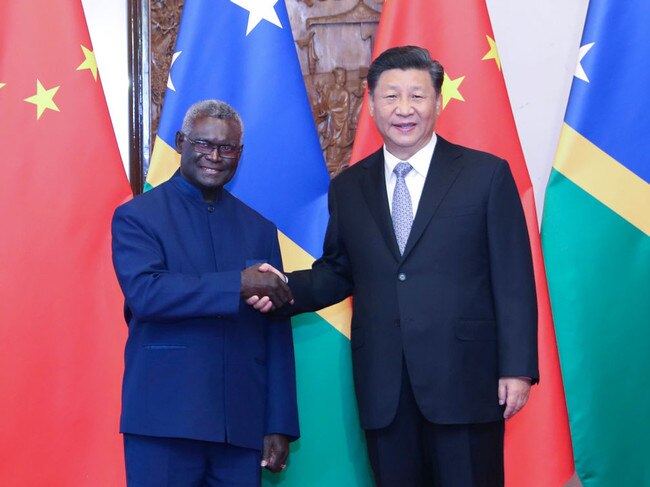
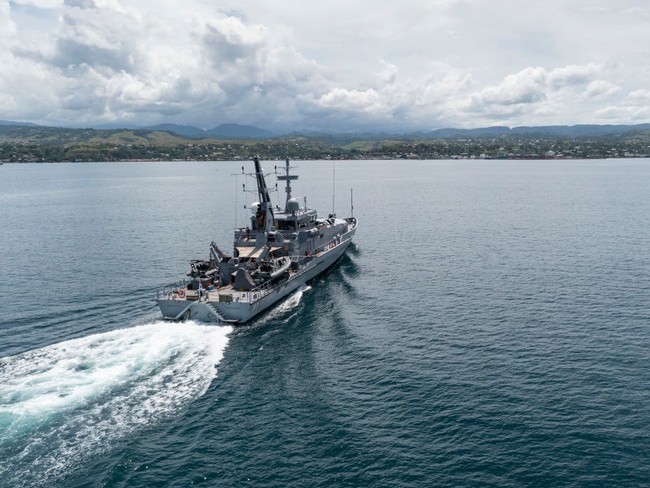
“The security agreement is one of the first of its kind in the Pacific; its scope is broad and suitably vague and its provisions range from maintaining public order through to protecting Chinese citizens and assets, and providing humanitarian and disaster relief,” she told The Sydney Morning Herald.
“The agreement also contains several ambiguous and potentially ambitious provisions with geopolitical implications including that China is seeking logistical supply capabilities and material assets located in Solomon Islands to support ship visits.
“If it comes under force, the agreement also contains references to China’s ‘own needs’ which could refer to China’s strategic interests; China’s pursuit of its strategic interests in the Pacific is of direct concern to Australia and its allies and partners.”
The deal would in some respects echo a similar agreement the Solomon Islands already has with Australia.
The shock move comes after several years of deteriorating relations between Australia and the Solomon Islands, which has been deepening ties with Beijing – even as the nation of 800,000 repeatedly called on Canberra to aid in peacekeeping efforts to quell unrest sparked by that very shift.
Last year, Prime Minister Scott Morrison announced the deployment of 73 Australian Federal Police and 43 Australian Defence Force personnel to the country after a desperate plea from embattled PM Manasseh Sogavare, amid several days of rioting in the capital Honiara which saw Chinese properties burned and looted.
The violence was pinned on a long-running rivalry between the islands of Malaita, the country’s most populous island, and Guadalcanal, home to the government. Tensions had been simmering between the islands since the national government suddenly switched diplomatic allegiance from Taiwan to China two years earlier.
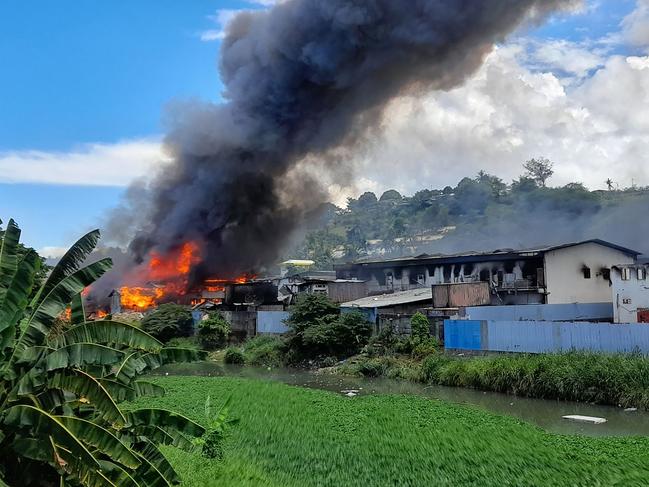
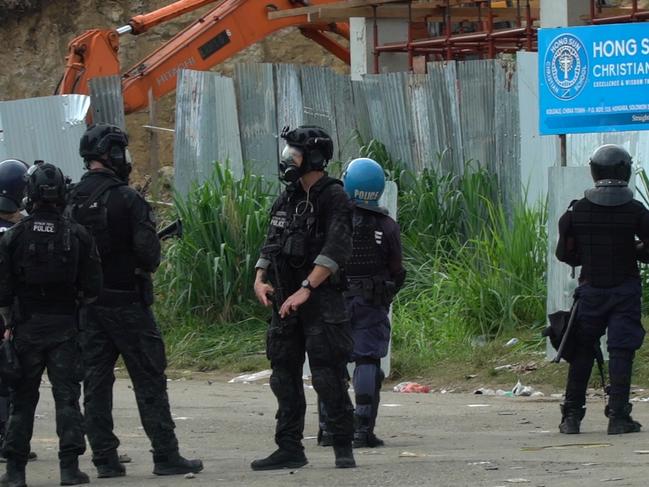
Daniel Suidani, Premier of Malaita, alleged China had “bribed” Mr Sogavare to switch allegiances, and that the PM had “elevated the interest of foreigners above those of Solomon Islanders”. “People are not blind to this and do not want to be cheated anymore,” he said.
Experts said the unrest was also fuelled by pandemic-related economic frustrations.
Australian Defence Force personnel were similarly deployed to the Solomon Islands in 2019, following deadly anti-government protests in Honiara as people demanded the resignation of Mr Sogavare.
Tensions escalated again in May 2021, when Mr Suidani sought medical treatment in Taiwan, a trip the government said was “unauthorised”.
“Malaita people are angry because they are the poorest, most underdeveloped province,” Monica Verma, an international relations expert at the South Asian University, said last year. “Their leader Daniel Suidani considers China as evil and has refused any Chinese interference in Malaita.”
Mr Sogavare defended his government’s decision to abandon its recognition of Taiwan in favour of mainland China. “It puts the Solomon Islands on the right side of history, and it is in line with international law,” he said.
He blamed “external factors” for the civil unrest and attacks on the Chinese community.
“These very countries that are now influencing Malaita are the countries that don’t want ties with the People’s Republic of China,” he said. “I don’t want to name names. We’ll leave it there. We know who they are.”

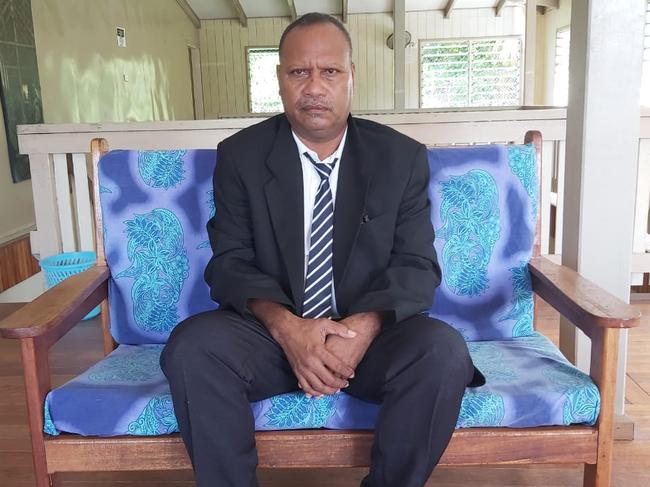
But Mr Sogavare thanked Canberra – despite its outspoken criticism of Beijing’s coercion tactics – for being his nation’s “best friend”.
“On behalf of the people of the Solomon Islands, I just want to thank the people and the government of Australia for coming to our aid,” he told the ABC last year. “I feel sorry for my people in Malaita because they are fed with false and deliberate lies about the switch (to Beijing). That’s the only issue, the only issue, and unfortunately, it is influenced and encouraged by other powers.”
Dr Powles said the new draft agreement “will likely be viewed in Malaita with suspicion and deep concern in the current climate of unease”.
Following the 2021 riots the United States announced it was reopening its embassy in Honiara, which had been closed in 1993.
China has since deployed police to train local forces, donated riot equipment and late on Thursday the Solomon Islands announced the signing of a memorandum of understanding on police cooperation with Beijing.
Earlier this week Australia’s High Commissioner in the country Lachie Strahan met Mr Sogavare and agreed to extend the “Solomons International Assistance Force” – deployed for last year’s riots – until December 2023.
Australia has been assisting in peacekeeping efforts in the Solomon Islands for two decades.
An Australian-led force intervened in 2003 after a six-year battle between rival ethnic groups from Malaita and Guadalcanal claimed more than 200 lives. It did so again in 2006 after rioters looted and destroyed Chinese-owned businesses amid allegations they had rigged the election of then-Prime Minister Snyder Rini.
Ultimately, Australia remained in the Solomons until 2017 at a cost of some $2.6 billion.
— with Ben Graham and Jamie Seidel
More Coverage
Originally published as China poised to sign crucial security deal in the Pacific with Solomon Islands




